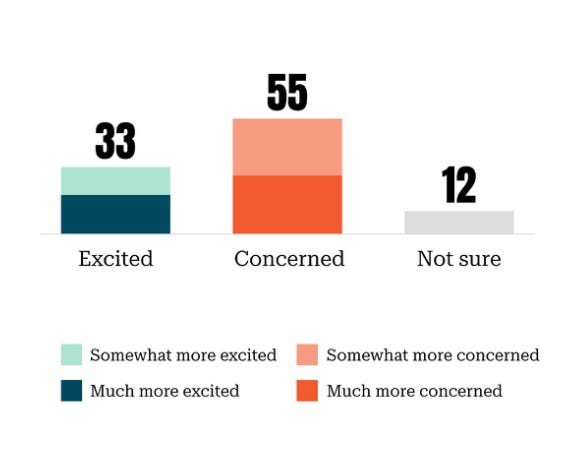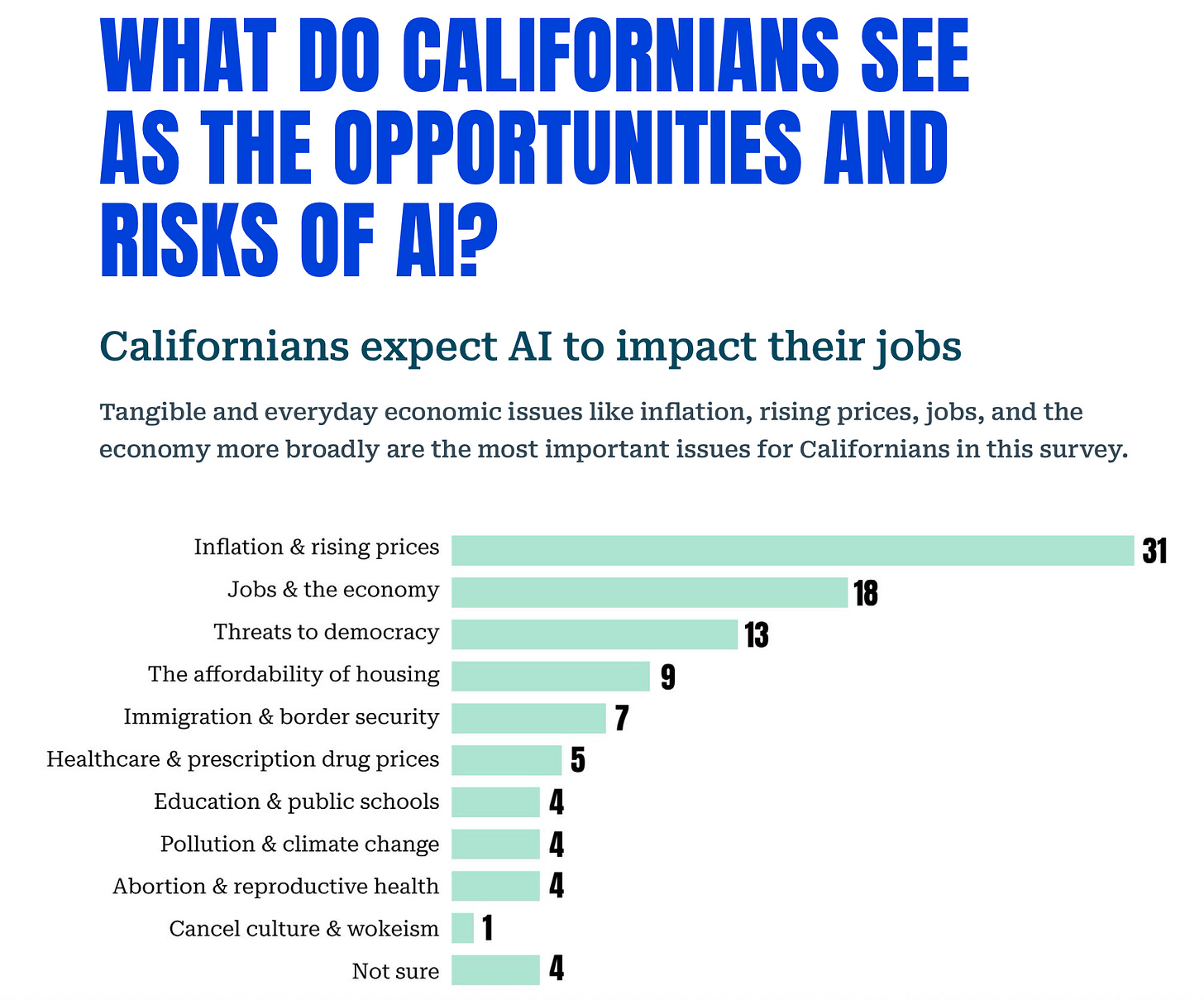Greetings friends,
First of all, thanks so much to everyone who upgraded their subscriptions and helped me clear out my garage in the process. I got so many requests for books that not only did I get relieved of all my remaining Blood in the Machine copies, but I had to ask the publisher if they had any more lying around I could send out to folks. Fortunately they did! They’re shipping me a box so I can sign them before mailing them out, and we’ll see if that covers everyone, but I’m completely drained of Blood at this point. That said, I still have copies of The One Device and Terraform: Watch/Worlds/Burn, so the offer still stands for signed copies of those. But it’s been more fun than I expected, hearing your stories about tech, AI, and luddism. So I might try something like that again in the future—maybe with extra copies of all the tech and SF books publishers are always sending me.
Onto today’s edition: I got early access to the findings of a new in-depth survey of a thousand-plus Californians that reveals some important insights about how voters are thinking about AI here. (Which matters of course since California is one of the few remaining places in the US with the power to meaningfully govern AI at all). Spoiler: Californians don’t love it.
We’ll also look at a breakdown of how AI is driving up energy prices, the latest devastating account in a fast-growing field of tragic stories about AI, depression, and loss, and Grok’s unhinged persona prompts. As always, you subscribers make this work possible. If you find value in original and critical reporting on AI, deep dives on labor automation, or polemics on the ascendant tech oligarchy, consider upgrading to a paid subscription so I can continue writing more of them. Finally, the next installment of AI Killed My Job is due out later this week, so stay tuned for that. Onwards, and hammers up.
Edited by Mike Pearl
California is extremely critical of AI
Residents of the state that launched the modern AI boom are deeply skeptical of the technology, and are overwhelmingly in favor of regulating AI companies, a new in-depth survey of Californians’ attitudes towards the technology finds.
This is crucial data because, as readers of this newsletter well know, given the Trump administration’s quest for American AI dominance and deregulation, if there’s going to be any meaningful democratic governance of AI in the United States at all over the next few years, it’s going to come from the states. And a lot of it’s going to come from California.
TechEquity, a tech accountability group, spearheaded the research, and interviewed 1,400 Californians about their feelings on AI. The findings were stark: 55% were more concerned than excited about AI, while only 33% expressed more excitement than concern. Meanwhile, 59% thought that “AI will most likely benefit the wealthiest households and corporations, not working people and the middle class.” And both Democrats and Republicans shared that view.
“Californians are more concerned than excited about advancements in AI,” Catherine Bracy, the CEO and founder of TechEquity told me. “Many feel it is advancing too fast, and are concerned about AI-fueled job loss, wage stagnation, privacy violations, and discrimination.” (Nearly half of Californians think that AI is advancing too fast, according to the poll, compared to just a third that think the current pace is acceptable.) “Both Democrats and Republicans agree that AI will most likely benefit the wealthiest households and corporations but not working people and the middle class.”
And perhaps most importantly, a full *70% of Californians* were in favor of “strong laws” that regulate AI. Now, this matters deeply, as those voters’ opinions are going to be the driving force for lawmakers who hope to blunt big tech’s power and prevent AI from becoming a wild west of worker surveillance, digital addiction, and labor automation.
I’ve spoken with a number of California reps and senators at this point, most of whom want to prevent AI systems from, say, propagating discrimination, surveilling workers, or automating hiring and firing decisions, and many who’ve proposed or supported bills that would do so. But they’ll now be up against a Silicon Valley that can direct its cannons of capital and influence at Sacramento rather than Washington.
OpenAI, Google, Meta, and the like are already no doubt enlisting armies of lobbyists to fight the slate of bills that will attempt to rein in AI products by any means possible. They’ll be mounting a campaign to whisper in the Valley-friendly governor’s ear to secure veto power.
“Our research found that while trust in the government to control AI is low across the board, people are less negative about Sacramento than Washington,” Bracy told me. “The root of this mistrust is that legislators are overly influenced by the tech industry. The polling makes clear that, regarding AI, support for policymakers depends on visible independence from tech industry influence.”
As such, lawmakers might want to pay keen attention to the fact that Californians understand the risks posed by AI products so well.
As TechEquity put it in a statement:
A supermajority of Californians have significant concerns about AI and want government to create guardrails on AI tools and the companies that build them. Clear majorities of respondents are concerned about AI-fueled job loss, wage stagnation, privacy violations, and discrimination…
And some more of the key findings:
An overwhelming majority favors policies including those that:
Protect privacy (81%)
Enforce civil rights (73%)
Enact non-discrimination rules (73%)
Californians are most concerned with AI’s impact on
Creating deepfakes (64%)
Spreading disinformation (59%)
Violating personal privacy (58%)
Reducing wages (55%)
Replacing low-paying jobs (52%)
“Our polling finds Californians echoing what we are seeing in poll after poll from across the country: voters are telling their representatives not to trust tech companies to self-govern,” Bracy says. “And this is not because they are anti-technology. It’s because they want companies to be held accountable, and aren’t willing to sacrifice safety and fairness for innovation.”
There are now decades of precedent. Silicon Valley companies have deployed products to manipulate users, surveil workers, and spread disinformation. Voters know that—they can already see that—a hands-off approach to AI will simply be more of the same, and very possibly worse.
“California legislators have a golden opportunity this fall to help rebuild trust with the public by showing whose side they are on,” as Bracy put it. “Conversely, those who side too closely with industry are likely to pay a political price for it.”
AI is spiking electricity prices across the US
Most of us know by now that the AI boom has led to a mad dash to build out data centers across the US, and to find energy sources to power them. What’s been less explored is how much all this is costing us in real dollars, on our electricity bills.

